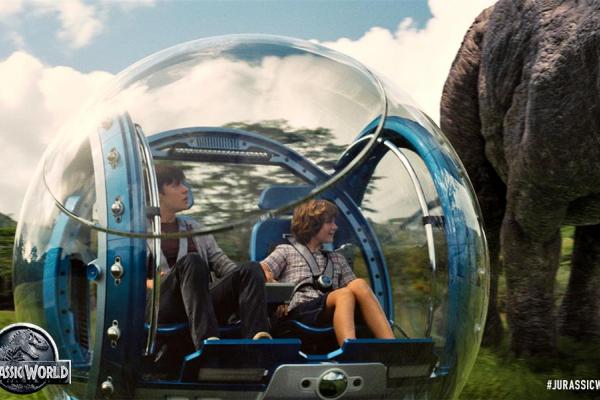Among the big releases this summer, two films offer new installments of iconic franchises. One, Mad Max: Fury Road is a master class in how to do it right. Made as a labor of love, not a studio cash-grab, it uses a familiar setting and hero to explore new artistic territory, and still maintains an insanely entertaining level of action.
The other is Jurassic World.
This latest sequel to Jurassic Park doesn’t know what it wants to be, and therein lies the problem. Most of the time, Jurassic World gives self-aware commentary on blockbuster reboots. But the film also tries to be exactly the thing it claims to hate, grander and more bombastic than the original Jurassic Park, while ignoring the quality of story and distinct characters that made Steven Spielberg’s 1993 film such a success in the first place.
The film imagines a future where Isla Nublar, site of the theme park dreamed up in the original film, now hosts Jurassic World. It’s a massively successful dino-zoo complete with resorts, rides, and excessive corporate sponsorship. Two brothers (Nick Robinson and Ty Simpkins), are sent to Jurassic World for a weekend with their aunt (Bryce Dallas Howard), a park manager. Things go awry when the park’s newest attraction, a genetically modified critter called Indominus Rex, escapes its enclosure, and wreaks havoc on the place. Chris Pratt plays a macho park wildlife expert who comes to the rescue.
Indominus Rex represents a constant need for surprise and excitement, something new that gives visitors a thrill, and gets media attention, but is created with no regard for how it’s made. It’s not unlike the nature of franchise reboots in Hollywood, a fact not lost on Jurassic World. Several characters in the film comment on the lack of need for a creature like Indominus Rex. Aren’t real live dinosaurs exciting enough? In metaphor terms, shouldn’t we be happy with what we have? Do we need another Jurassic Park movie?
Of course we don’t. But once the movie asks that question, it tries to have its cake and eat it, too. Jurassic World doesn’t bother with the possibility that a big-budget franchise reboot doesn’t have to be bad. Instead it just gives us broadly painted, stereotyped (and sometimes casually sexist) characters with no real motivation or story, and hopes we’ll stick around for the ride.
To be fair, there is a lot of flash and fun when it comes to the film’s dinosaurs, which are meant to be the main attraction anyway. The velociraptors get entertaining roles, as does good old T-Rex. Indominus Rex, however, doesn’t get to be as showy, which is another odd choice. The movie’s biggest star, its very reason for being, is often relegated to the background, where it rustles leaves ominously before showing up, chowing down, and moving on.
Was Jurassic World ever going to be a classic on the level of Jurassic Park? No. It’s an unfair comparison. It might also be unfair to compare it to Fury Road, a film that was decades in development before it came to glorious fruition. However, it still feels like Jurassic World started from a place of defeat. It’s a tone-deaf studio job given the once-over by skeptical filmmakers before they opted for the easy out. The result is an inconsistent film that isn’t sure how seriously to take itself, or even how much it should care.
Abby Olcese is the Advertising Assistant for Sojourners.
Got something to say about what you're reading? We value your feedback!
